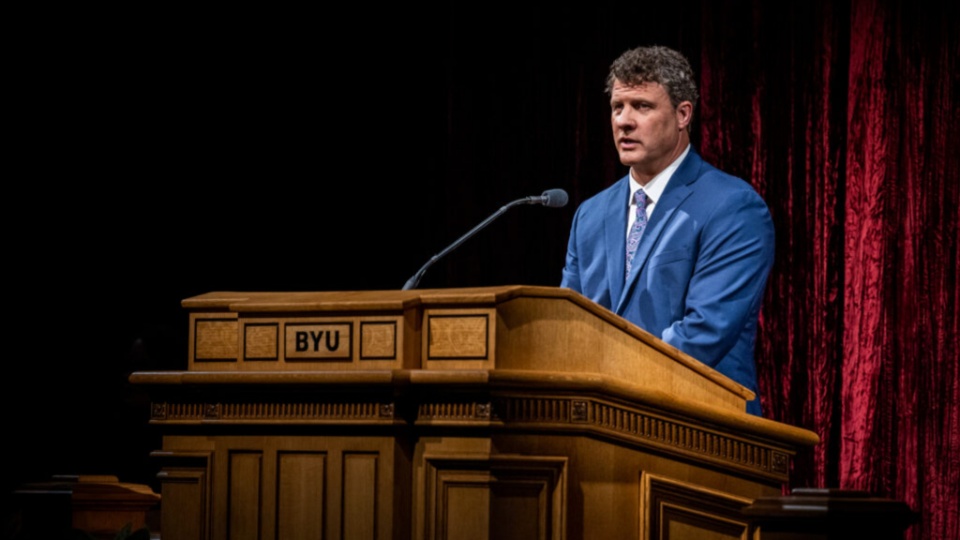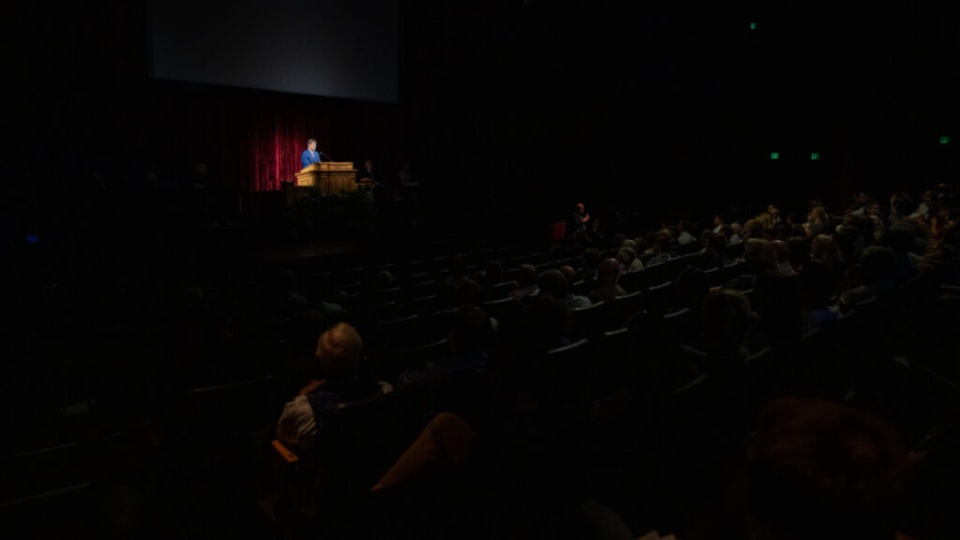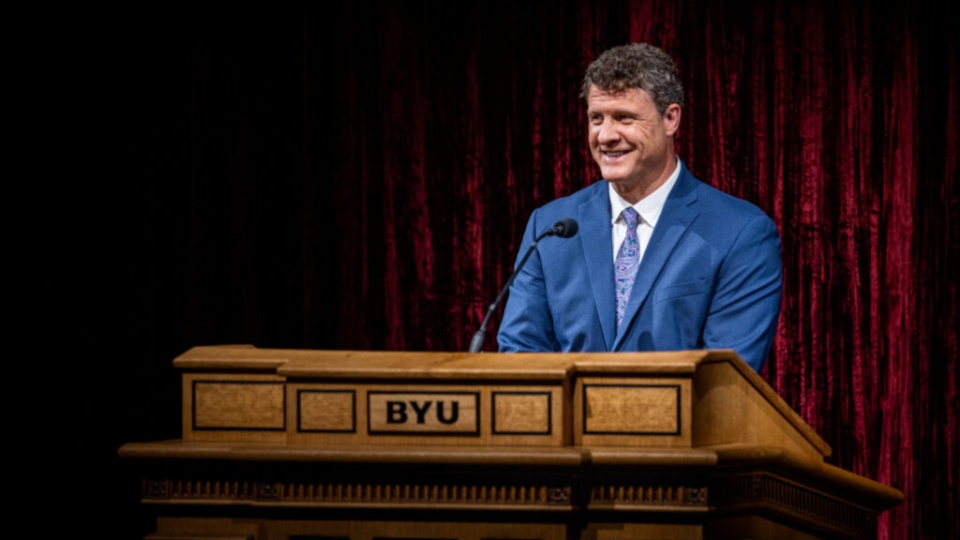
Harper-Devo
BYU professor Steven Harper instructs students about “becoming a seeker” in a BYU devotional on Tuesday, June 8, 2021. Photo by Joey Garrison, courtesy of Church News.All rights reserved.This story appears here courtesy of TheChurchNews.com. It is not for use by other media.
By Megan McKellar, Church News
When Steven Harper, a Brigham Young University professor of Church history and doctrine, was 10 years old, he and his Methodist best friend decided they would know which church was true based on the outcome of the Southern Methodist University vs. BYU Holiday Bowl football game in December 1980.
“With no time left on the clock, quarterback Jim McMahon threw a Hail Mary that Clay Brown caught amid a thicket of defenders in the end zone,” Harper recalled during a BYU devotional on Tuesday, June 8, 2021. “It was a miracle. Now I knew which church was true,” he said with a smile.
At the time, his conclusion was challenged a bit when he learned that the winning pass was thrown and caught by two Catholics. But when the BYU men’s basketball team defeated Notre Dame the following spring thanks to a game-winning layup by Danny Ainge, all was made clear and simple once more to his young mind.
“That is a true story. Well, it’s actually more complex than that,” Harper conceded. “It’s a historical narrative. There is nothing false in the story, but it is overstated and overly simple.”
In the present day, narratives of all sorts abound. To know which narratives are trustworthy and to lay the foundation for a true testimony, Harper recommended looking to the Lord’s counsel in Doctrine and Covenants 88:118:
“And as all have not faith, seek ye diligently and teach one another words of wisdom; yea, seek ye out of the best books words of wisdom; seek learning, even by study and also by faith.”
Another way to read the first line of that scripture is, “Since none of us has too much faith, we should be seekers,” according to Harper.
“Becoming a seeker is hard intellectual and spiritual work. It is a long, slow, deliberate process,” Harper said. “A seeker might Google as part of the process, but Googling and seeking are not synonyms. And ‘just’ praying about something is not seeking either.”

Harper-Devo
BYU professor Steven Harper instructs students about “becoming a seeker” in a BYU devotional on Tuesday, June 8, 2021. Photo by Joey Garrison, courtesy of Church News.All rights reserved.Seekers need to learn to identify and interrogate assumptions. Harper often asks his students what they know and how they know it because it helps them to be aware of their own thought processes, or “metacognitive.”
Marie and Bruce Hafen’s book, Faith Is Not Blind, explains how faith first begins to develop in simplicity. This simplicity includes faith in truths like “I am a child of God and He has sent me here,” but also in assumed ideals like “He has given me an earthly home with parents kind and dear.”
While this simplicity is “a perfectly fine place to begin exercising faith,” the Lord intends for His children to develop deep and mature faith.
“As we grow up, we learn that things are more complex than we may have been taught and assumed,” Harper said. “You’re not odd or out of place if you’re encountering complexity as you progress in the plan of happiness.”
When complexity is confronted, he added, “we become aware that there is more than one narrative, more than one point of view. … We choose whether our faith will grow up, continue to be childish, or die.”
Seekers make that choice by diligently learning from the best sources, not “other peoples’ opinions about the best sources,” Harper said.
Seekers also learn to be source critics and carefully evaluate sources of knowledge.
“Both study and faith are vital. Seekers recognize that rationality and spiritual experience can be both reliable paths to knowledge and that they can both be fickle and subjective,” Harper taught. “Seekers don’t privilege the head over the heart or vice versa. … They trust that the Lord will reveal to their mind and to their heart, as He promised.”
Simplicity on the other side of complexity, as the Hafens call it, comes after intentionally studying facts and narratives.
“Simplicity is naïve faith. Other side of simplicity is informed faith. … For our faith to grow and develop according to God’s plan, we must come to terms with complexity but not get stuck there,” Harper said. “The plan is for us to seek our way from simplicity through complexity, by study and by faith, until we arrive at the simplicity on the other side of complexity.”

Harper-Devo
BYU professor Steven Harper instructs students about “becoming a seeker” in a BYU devotional on Tuesday, June 8, 2021. Photo by Joey Garrison, courtesy of Church News.All rights reserved.Harper then addressed confirmation bias, explaining that being biased is a human condition, but bias thrives when we ignore evidence. “So what I am advocating is that we be aware of our biases and educate them,” he said.
During Harper’s full-time mission for The Church of Jesus Christ of Latter-day Saints, he set out to become an expert on the scriptures. He enrolled in Biblical Hebrew and Old Testament at BYU upon returning home and discovered the complexity of the Old Testament.
“The more I studied the Old Testament, the less I knew — or, rather, the more metacognitive I became about how little I knew and about how complicated knowing was,” he recounted.
While Harper was earning a PhD, he discovered the rich documentation of the Restoration, including Joseph Smith’s autobiographies, journals, letters, translation manuscripts and revelation manuscripts. “It was thrilling to realize that I could study the handwritten source material of a real live revelator,” he recalled.
He said he also learned the importance of “slowing down enough to pick a proposition apart, determining what it means and deciding whether it can be justified.”
For example, the proposition that Joseph Smith was a revelator — “What does it mean? Can it be justified? … How would you arrive at the definition?”
Working with “sources of knowledge,” such as Joseph Smith’s manuscripts and the journals and letters of an early convert to the Church named William McLellin, showed Harper that “brainwork” could strengthen his faith.
“It also exposed some of my assumptions,” Harper said. “It taught me to think more carefully and critically. … It taught me to expect and cope with ambiguity and paradox in people, including prophets like Joseph Smith and apostles like William McLellin.”
Harper invited listeners to do their own seeking and expressed his “justified confidence in your abilities to seek diligently by studying the best books while exercising faith. And I have good reason to believe that the Lord will tell you in your mind and in your heart by the Holy Ghost.”
Copyright 2021 Deseret News Publishing Company